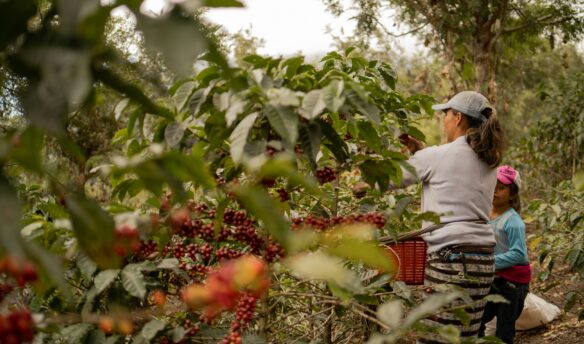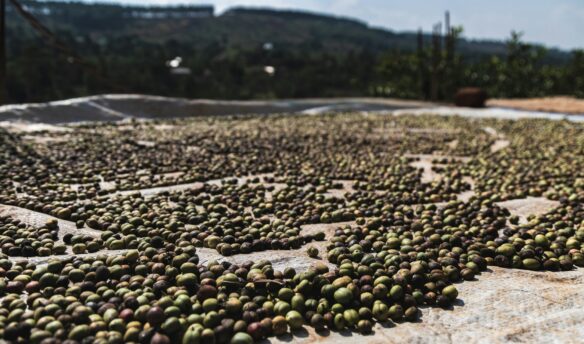Farmers are fighting coffee counterfeiting with fingerprints. Plus, an anti-caffeine subreddit wants you to give up your morning brew.
‘How Coffee Farmers in Hawaii Fought Counterfeit Kona Beans’ – via New York Times
The name of particular coffee-growing regions carries weight simply beyond indicating a locale. When you hear a coffee is from the Yirgacheffe region of Ethiopia, you might already associate it with floral aromas and a tea-like body; for coffees from the Huehuetenango region of Guatemala, perhaps you conjure a cup that is balanced and silky. For these regions, their fame and notoriety precede them: you see their name and know (or at least have an idea) what you’re getting.
Counterfeit or mislabeled goods are a constant problem for producers of origin-specific items—think champagne not from the Champagne region of France or fake olive oil. Even coffee is sometimes smuggled across borders to fetch a higher price in a neighboring country.
Kona coffee, which is grown in Hawaii, is some of the most expensive coffee in the world. For farmers, being able to chemically fingerprint their coffee was the key to winning a series of settlements with distributors and retailers who they accused of labeling much cheaper coffee as Kona.
Farmers in Hawaii alleged that groups of distributors and retailers were “using the Kona name in a misleading way,” according to reporting from the New York Times. After a five-year-long legal battle, farmers won more than $41 million from grocery store chains and distributors.
The outcome of the case hinged on a chemical analysis performed by a private lab in Utah. A team of researchers used a geological approach to test coffee samples from around the world, comparing them to samples from hundreds of coffee beans from Kona farms and mapping the different mineral concentrations in the beans.
The Kona samples contained unique ratios of inorganic minerals that made them stand out. “We were able to establish a fingerprint for Kona,” said Dr. James Ehleringer, who led the research. “It’s the characteristics of the volcanic rock.”
Although several questions persisted—for example, some defendants argued that other labs couldn’t replicate Dr. Ehleringer’s work—the two sides settled before the case went to court.
‘Welcome to r/decaf, the Anti-Caffeine Subreddit Where No Coffee Is a Religion’ – via Rolling Stone
According to r/decaf, a subreddit with more than 40,000 members, coffee is very much not good for you. This corner of the internet, profiled in a recent article in Rolling Stone, believes that giving up caffeine is “a hero’s journey” and that doing so can cure a range of issues from acne and depression to insomnia and even existential angst.
“I just wanted to put this out there, in case anyone has quit caffeine but is struggling with productivity or lack of motivation: It’s not withdrawal,” one post reads. “You’re a spiritual creature in a cold, mechanical system, and now there’s no hiding.”
According to the article, users of r/decaf talk about coffee like it’s an illegal drug. They use terms like “junkie,” “relapse,” and “cold turkey” to discuss their battle with caffeine and post memes to inspire each other to stay strong.
Of course, caffeine is a drug—it’s a stimulant that affects the brain and central nervous system—and consuming too much can cause issues. However, as doctors interviewed by Rolling Stone note, the key is not to overdo it. “From an epidemiological perspective – this definitely comes down to moderation,” said Dr. Katrine Wallace from the School of Public Health at the University of Chicago at Illinois. “Anything consumed in excess can cause harm, even water. Caffeine, while naturally occurring, is a central nervous system stimulant. If someone drinks too much they can definitely experience high heart rate, insomnia, anxiety, headaches, GI issues, etc.”
In fact, caffeine can help with many health issues, from type 2 diabetes to cardiovascular disease. “Caffeine can certainly cause adverse effects and even be toxic depending on how much is consumed but it has also been shown to have positive effects at lower, more ‘standard’, doses,” said Ryan Marino from Case Western Reserve University School of Medicine. “Everyone is different and everyone responds differently to biologically active and technically ‘mind-altering’ substances.”
More News
‘UK-based The Gentlemen Baristas Placed into Administration’ – via World Coffee Portal
‘Brazil’s Coffee Production to Rise 5.5% in 2024, says Conab’ – via Nasdaq
‘German Man Breaks Record For World’s Fastest Time To Drink A Cup Of Coffee‘ – via Sprudge
‘Sustainability Certifier 4C Launches EUDR Compliance Services for Coffee’ – via Daily Coffee News
‘Australian Open Announces Multi-year Deal with Luckin Coffee’ – via Global Coffee Report
‘Go Fund Bean to Dissolve, Offers Final Round of Grants’ – via Daily Coffee News
‘A Coffee Shop Wedding Goes Viral, for the Wrong Reasons’ – via New York Times
The Week in Coffee Unionizing
On January 11th, 2024, workers at a Pittsburgh, Pennsylvania, coffee chain announced their intent to unionize. A few hours later, the company announced that it was closing.
Adda Coffee & Tea House had four locations around the city, and the official reason given for closing was financial. “Sadly, we have been operating at a loss since the beginning, which has been exacerbated by the pandemic,” the company shared on Facebook. “Despite everyone’s best efforts, our monetary reserves are depleted and we need to close our doors.”
However, employees, many of whom rallied together in the freezing cold to demand severance pay, were skeptical of this motive. “Why were we hiring a second general manager and additional staff if the business was failing?” one worker interviewed by WESA FM asked.
“It sure is curious that given Sukanta [Nag, Adda’s owner] has told us that Adda has been operating at a loss since the day it opened, he was in no rush over those eight years to close even a single location until the very next day after we announced our organization to him,” another commented.
The company’s 30 employees cited issues with inconsistent schedules, cuts in hours, and “myriad terminations of employees who had their jobs simply given away to someone the owner liked.”
The union representing the workers, United Food and Commercial Workers Local 1776, said it was exploring legal options. “We believe they violated labor laws. It’s illegal to shut down for union activity,” Lance Huber, director of the western division of UFCW Local 1776, told WESA FM.
In a follow-up statement, Nag insisted that the reasons for the closure were solely financial: “Our final determination was solely and entirely based on the financial viability of the business. The timing has been unfortunate but we could no longer continue losing money.”
Beyond the Headlines
‘Unintended Consequences of EU Deforestation-Free Regulation (EUDR) on Smallholder Coffee Producers, Part 1’ and Part 2 by Andrew Hetzel
‘The Tyranny of the Algorithm: Why Every Coffee Shop Looks the Same’ by Kyle Chayka















